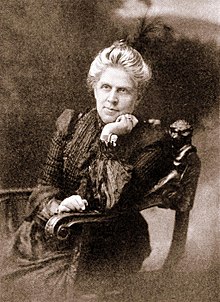Harriet Williams Russell Strong
Harriet Williams Russell Strong (born July 23, 1844 in Buffalo , New York , † September 6, 1926 in Los Angeles County , California ) was an American hydraulic engineer , inventor , conservationist and suffragette .
Life
Harriet Williams Russell Strong was the fourth daughter of Henry Pierrepont and Mary Guest Russell. She attended Young Ladies Seminary in Benicia after the family moved to California because of her mother's poor health . On February 26, 1863, she married the mining engineer Charles Lyman Strong and had four daughters, Mary, Harriet, Georgina and Nelle. Her husband died in 1883 and inherited a large amount of land, including several nut and fruit plantations. Harriet Williams Russell Strong took care of the land management and developed a system to better irrigate the plantations. She patented this invention and founded a company specializing in irrigation technology.
She became an activist for water protection and energy generation through hydropower . In the following years she received several patents for the construction of dams and reservoirs . She became a member of the Los Angeles Chamber of Commerce and was delegated by them as the first woman to represent at the annual meeting of the United States Chamber of Commerce in 1918 . In 1918 she advised the Congressional Committee on Hydropower and advocated energy generation through dams on the Colorado River .
Harriet Williams Russell Strong founded Ebell of Los Angeles , an association for higher education for women. Together with Susan B. Anthony , she campaigned for women's suffrage .
She died at the age of 82 and was buried in the Forest Lawn Memorial Park in Glendale .
Honors
At the World's Columbian Exposition in Chicago in 1893 , Harriet Williams Russell Strong was awarded two prizes for her innovations in water management.
In 2001 she was inducted into the National Women's Hall of Fame .
literature
- James Terry White (Ed.): Strong, Harriet Williams Russell In: The National Cyclopaedia of American Biography , New York 1893 ( online version at Open Library )
Web links
- Harriet Williams Russell Strong on the National Women's Hall of Fame website
- Harriet Williams Russell Strong in the database of Find a Grave (English)
- Biography and images of some of the Whittier Museum patents
| personal data | |
|---|---|
| SURNAME | Strong, Harriet Williams Russell |
| ALTERNATIVE NAMES | Strong, Harriet Russell; Williams Russell, Harriet (maiden name) |
| BRIEF DESCRIPTION | American inventor, conservationist and suffragette |
| DATE OF BIRTH | July 23, 1844 |
| PLACE OF BIRTH | Buffalo , New York (State) |
| DATE OF DEATH | September 6, 1926 |
| Place of death | California |
